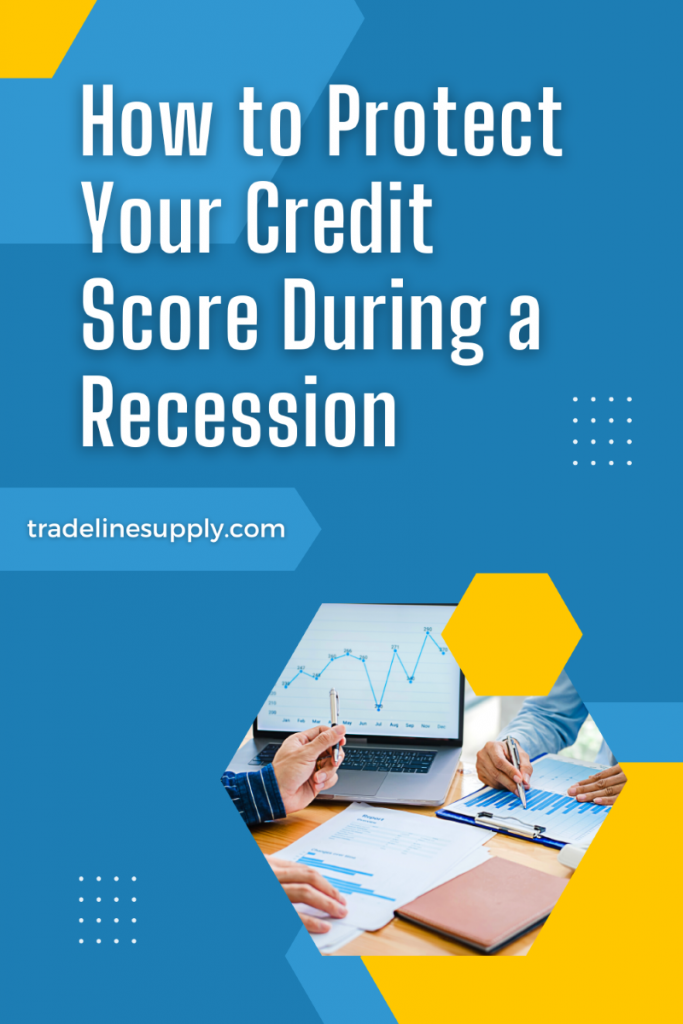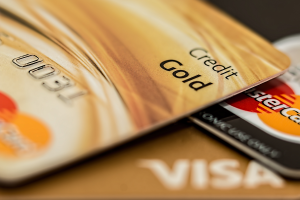 When a recession is on the horizon, it’s time to prepare your finances for the potential storm ahead. Although a recession can batter personal finances across the country, it’s possible to protect your financial situation and credit score with a bit of preparation.
When a recession is on the horizon, it’s time to prepare your finances for the potential storm ahead. Although a recession can batter personal finances across the country, it’s possible to protect your financial situation and credit score with a bit of preparation.
If you are ready to protect your credit score from economic storm clouds, then it’s time to take action.
How a Recession Could Impact Your Credit Score
Your credit score is a three-digit number that measures how well you manage your debt responsibilities.
A recession won’t directly impact your credit score. But the fallout of a financial crisis can lead to changes in your ability to meet financial obligations, and your credit score can suffer.
Here’s a closer look at how a recession might affect your credit score.
Unemployment Possibilities
Typically, high unemployment rates accompany a recession. The unfortunate reality is that it’s possible to lose your job during a recession, even if you think your company is well-positioned to thrive in a recession.
If you lose your job, it can be difficult to keep up with your financial obligations. The lack of a paycheck can lead to a pinched budget. Without money coming in, you’ll be forced to make different financial choices that could hurt your credit score.
Credit Utilization
Your credit utilization ratio is an important credit scoring factor. Ideally, it’s best to keep your credit utilization ratio below 10%. A higher credit utilization ratio could have a negative impact on your credit score.
How can you calculate your credit utilization ratio? Take the balances on revolving credit accounts and divide that number by your credit limit. For example, let’s say you have a credit card with a $10,000 limit. Your current balance is $4,000. With that, your credit utilization ratio on that account is 40%.
Sticking to a low credit utilization ratio might be easier during prosperous economic times. But when the waves of a recession hit your household, you might have to turn to debt to stay afloat. The purchasing power obtained through a credit card can help you meet basic needs. However, running up a high balance will hurt your credit score.
Late Payments
A recession can mean higher prices and less money coming in the door. The double hit to your finances means you might have to make big changes to your spending habits.
Depending on the situation, you might be forced to prioritize spending and fall behind on outstanding debt payments. Missed payments will hurt your credit score.
Of course, you may try to get another job or replace your income through a creative side hustle. But those options can take time. If you don’t have a financial safety net, it’s easy to fall behind on payments.
How to Protect Your Credit Score in a Recession
It’s clear that the financial impacts of a recession can hurt your credit score. The good news is that it’s possible to build in protections to safeguard your credit score regardless of the economic climate.
Here are some steps you can take to protect your credit score from uncertain times.
Build an Emergency Fund
The first step in protecting your credit score, and the rest of your finances, is to build an emergency fund. With a healthy emergency fund in place, you can handle whatever life throws your way.
Most experts recommend saving between three to six months’ worth of expenses. But the amount you choose to stockpile in an emergency fund varies based on your situation. For example, if you work in a relatively recession-proof industry, then three months of expenses might be sufficient. But if you are self-employed, you might want to build out a more robust emergency fund.
If a recession hits your finances in the form of unemployment or higher prices for everyday goods, then you’ll be able to cover the costs for a few months. That time gives you enough time to sort out a long-term plan.
Live Within, or Below, Your Means
Whether or not it’s a recession, it’s important to live within your means. Essentially, that means spending less money than you make. If possible, it’s best to live well below your means.

But the reality is that many households live beyond their means. The societal pressure to keep up with the Joneses pushes many to buy more than they can reasonably afford. Although it’s possible to obtain more consumer goods through credit, that habit can lead to a budget that’s stretched dangerously thin.
If you aren’t sure how to live below your means, start by separating needs from wants. It can be tricky to separate the two. For example, you might need a vehicle to get to work. But that doesn’t necessarily mean you need a luxurious pickup truck. After all, you can likely find a more affordable ride to suit your needs and your budget.
Taking action to limit your lifestyle spending can protect your credit score when a recession hits. Without lifestyle payments to keep up with, your leaner budget offers a chance to pivot more easily when times get tight.
Stick to a Budget
A budget is a key part of a healthy financial picture.
Although many think of budgets as a constrictive force designed to pull the fun out of life, that’s not true! When you build a budget and track your spending, you can spot areas of your life where you are comfortable cutting back. These strategic cutbacks can help you spend more on what really matters to you.
For example, when building a budget, you might come across subscriptions that you rarely use. If you cancel those subscriptions, you can use those funds to finance things that do matter to you. You might decide to stash those savings away for retirement or use the funds to pay for a hobby that you truly enjoy.
Pay Off Debt
If you head into a recession with debt, that can take a major toll on your finances and your credit score. Although you might be able to keep up with your debt payments at the moment, the unexpected events of a recession could change your financial picture.
When you have monthly debt payments to keep up with, your financial choices are more limited. If you lose your job, it might be impossible to keep up with all of your payments. So, paying down debt gives your finances the flexibility you might need during a recession.
Not sure how to pay down debt? It can be a challenge. But a framework like the snowball or avalanche methods can help you stick to your debt-free goals.
Here’s how each works.
The snowball method works by paying off debts from smallest to largest. You’ll start putting any extra funds available for debt repayment towards the smallest balance. Once it’s eliminated, you can move on to the next highest balance.

As you conquer debts, you can add that minimum monthly payment to your debt snowball. As the snowball grows, you can tackle bigger debts. When using the snowball method, you’ll encounter small wins along the way that serve to keep you motivated throughout your debt repayment journey.
The avalanche method is another popular debt repayment strategy. It works by paying off debts with the highest interest rate first. Again, you’ll put extra funds towards the debt with the highest interest rate. Once that debt is eliminated, you can move on to the debt with the next highest interest rate. The “avalanche” grows as you get rid of debts.
The math behind the avalanche method makes it more efficient. But the reality is that paying off debt isn’t always a numbers game. In many cases, we need the motivational wins that come with paying off small debts completely.
Both methods work. But you’ll have to decide for yourself which option fits your money goals.
How to Improve Your Credit Score
The key to protecting your credit score during a recession is to keep your financial options open. That means saving money and keeping expenses low to avoid economic distress in hard times.
A good credit score can come in handy whether or not you are facing a recession. But your credit score may be even more important during a recession. That’s because a good credit score gives you easier access to better financing opportunities when you need them.
With that, building a good credit score should always be a priority. But it’s especially important when the economy is flashing warning signs of hard times ahead.
Here’s how to improve your credit score during a recession.
Make On-time Payments
Payment history is the biggest factor for your credit score and accounts for 35% of your FICO score. So, making on-time payments is a big deal. If you can maintain a positive history of on-time payments, your credit score should improve.
But making on-time payments can be easier said than done.
If you struggle to keep up with the deadlines, sign up for autopay. An assist from technology means you’ll never forget a payment again.
However, a forgotten deadline isn’t always the root cause of missing a payment. In some cases, you simply don’t have the cash to make a payment. If you are in the midst of a recession, a decreased income might make it hard to keep up with your payments. If you know you are going to miss a payment, reach out to the lender.
It’s surprising. But many creditors are willing to offer you a helping hand. A changed due date or temporary forbearance could be just what you need to get cash flow under control. Don’t be afraid to ask for this assistance.
Use Alternative Credit Payments
You might pay all of your bills on time. But if you don’t have a credit account, you won’t build credit automatically. Instead, you have to get creative to turn your payment history for other accounts into alternative credit data.
A few bills you might be able to get credit for include rent, utilities, cellphone plans, and subscription streaming services. One way to get credit for alternative bills is to sign up for Experian Boost. The service takes a look at your bank accounts to see if you are making on-time payments. Average users of this free service report seeing score increases of 13 points.
However, you’ll need to be the primary owner of the account. So, if you are splitting Netflix with a roommate, you won’t get credit if the account is in their name.
Monitor Your Credit Report
A credit report is related to your credit score, but it’s not the same thing. The information found on your credit report serves as the foundation for your credit score. So, any negative information on your credit report means your credit score will suffer.
As you navigate the financial turmoil of a recession, it’s important to keep tabs on your credit report. Checking out your report at least once a year can help you spot any mistakes that could be hurting your credit score.
For example, if a lender incorrectly reports a missed payment, your credit score might drop.
Credit Repair
If you spot any incorrect information on your credit report, it’s time to consider credit repair. Credit repair is the process of removing inaccurate information from your credit report. If the incorrect information is negative, this action can be a boon to your credit score.
When considering credit repair, you have two options. You can work with a reputable credit repair company or go the DIY route.
The DIY option involves contacting the credit bureaus to file a dispute. When filing a dispute, you’ll need to provide details on why the information is a mistake. After the dispute is filed, the credit bureau will make corrections within 30 days if they agree with your information. If they don’t agree that it’s a mistake, they’ll let you know in writing.
Depending on the situation, it can be helpful to work with a credit repair company. For example, if you have an extensive number of mistakes on your credit report, it might be worthwhile to pass off the task to a reputable credit repair company.
The Bottom Line
A recession can indirectly impact your credit score. Taking preemptive action can help you avoid a big hit to your credit score if the financial fallout affects your household.
In addition to protecting your credit score, the actions above will help protect your entire financial picture. If possible, take action on protective measures for your household finances today.

